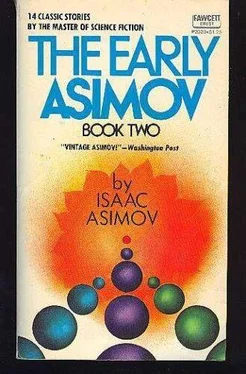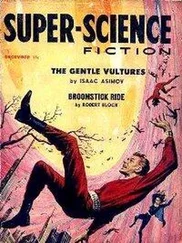Isaac Asimov - The Early Asimov. Volume 2
Здесь есть возможность читать онлайн «Isaac Asimov - The Early Asimov. Volume 2» весь текст электронной книги совершенно бесплатно (целиком полную версию без сокращений). В некоторых случаях можно слушать аудио, скачать через торрент в формате fb2 и присутствует краткое содержание. Год выпуска: 1986, ISBN: 1986, Издательство: Del Rey, Жанр: Фантастика и фэнтези, на английском языке. Описание произведения, (предисловие) а так же отзывы посетителей доступны на портале библиотеки ЛибКат.
- Название:The Early Asimov. Volume 2
- Автор:
- Издательство:Del Rey
- Жанр:
- Год:1986
- ISBN:ISBN: 034-532589-3
- Рейтинг книги:5 / 5. Голосов: 1
-
Избранное:Добавить в избранное
- Отзывы:
-
Ваша оценка:
- 100
- 1
- 2
- 3
- 4
- 5
The Early Asimov. Volume 2: краткое содержание, описание и аннотация
Предлагаем к чтению аннотацию, описание, краткое содержание или предисловие (зависит от того, что написал сам автор книги «The Early Asimov. Volume 2»). Если вы не нашли необходимую информацию о книге — напишите в комментариях, мы постараемся отыскать её.
The Early Asimov. Volume 2 — читать онлайн бесплатно полную книгу (весь текст) целиком
Ниже представлен текст книги, разбитый по страницам. Система сохранения места последней прочитанной страницы, позволяет с удобством читать онлайн бесплатно книгу «The Early Asimov. Volume 2», без необходимости каждый раз заново искать на чём Вы остановились. Поставьте закладку, и сможете в любой момент перейти на страницу, на которой закончили чтение.
Интервал:
Закладка:
Semper Gor laughed suddenly. 'Space, time and little meteors. Of course! The Earthmen would be putty in the hands of their own personifications of storm and motherhood come to life. In two hundred years - why, in two hundred years, we could do anything.'
'But this so-called trade mission of yours, Porus,' interposed Prat. 'How would you get Homo Sol to accept it in the first place?'
Porus cocked his head to one side. 'Dear Colleague Prat,' he murmured, 'do you suppose that I created the passive panic just for the show - or just to gratify five woodenheads? This passive panic paralyzed industry, and the Terrestrial government is faced with revolution - another form of mob action that could use investigation. Offer them Galactic trade and eternal prosperity and do you think they'd jump at it? Has matter mass?'
The Rigellian cut short the excited babble that followed with an impatient gesture. 'If you've nothing more to ask, gentlemen, let's begin our preparations to leave. Frankly, I'm tired of Earth, and, more than that, I'm blasted anxious to get back to that squid of mine.'
He opened the door and shouted down the corridor: 'Hey, Haridin! Tell Arn to have the ship ready in six hours. We're leaving.'
'But… but -' The chorus of puzzled objections crystallized into sudden action as Semper Gor dashed at Porus and snatched him back as he was on the point of leaving. The little Rigellian struggled vainly in the other's powerful grasp.
'Let go!'
'We've endured enough, Porus,' said Gor, 'and now you'll just calm down and behave like a Humanoid. Whatever you say, we're not leaving until we're finished. We've got to arrange with the Terrestrial government concerning the trade mission. We've got to secure approval of the board. We've got to pick our psychologist. We've got to -'
Here Porus, with a sudden jerk, freed himself. 'Do you suppose for one moment that I would wait for your precious board to start to begin to commence to consider doing something about the situation in two or three decades?
'Earth agreed to my terms unconditionally a month ago. The squad of Canopans and Betelgeusans set sail five months ago, and landed day before yesterday. It was only with their help that we managed to stop yesterday's panic - though you never suspected it. You probably thought you did it yourself. Today, gentlemen, they have the situation in full control and your services are no longer needed. We're going home.'
'Homo Sol' has a plot of a sort that particularly appealed to Campbell. Although the human beings in the story are far be-hind the other intelligences of the Galaxy, it is clear that there is something special about them, that they have an unusual ability to move ahead very quickly, and that everyone else had better watch out for them.
Campbell liked stories in which human beings proved themselves superior to other intelligences, even when those others were further advanced technologically. It pleased him to have human beings shown to possess a unique spirit of daring, or a sense of humor, or a ruthless ability to kill when necessary, that always brought them victory over other intelligences, even against odds.
I sometimes got the uncomfortable notion, however, that this attitude reflected Campbell 's feelings on the smaller, Earth scale. He seemed to me to accept the natural superiority of Americans over non-Americans, and he seemed automatically to assume the picture of an American as one who was of northwest European origin.
I cannot say that Campbell was racist in any evil sense of the term. I cannot recall any act of his that could be construed as unkind, and certainly he never, not once, made me feel uncomfortable over the fact that I was Jewish. Nevertheless, he did seem to take for granted, somehow, the stereotype of the Nordic white as the true representative of Man the Explorer, Man the Darer, Man the Victor.
I argued with him strenuously on the subject, or as violently as I dared, and in years to come our relationship was to be as nearly strained as it could be (considering our mutual affection, and all that I owed him) over the civil rights issue. I was on the liberal side of the issue, he on the conservative, and our minds never met on that subject.
All this had an important bearing on my science fiction work. I did not like Campbell 's attitude concerning humanity vis-a-vis other intelligences and it took two revisions of 'Homo Sol' before Campbell could move me close enough to what he wanted. Even then, he inserted several paragraphs, here and there, without consulting me, in the final version.
I tried to avoid such a situation in future. One way out was to depart from the traditions of those writers who wove plots against the gigantic web of entire galaxies containing many intelligences - notably those of E. E. Smith and of Campbell himself. Instead, I began to think of stories involving a galaxy populated by human intelligences only.
This came to fruit, soon enough, in the 'Foundation' series. Undoubtedly the Smith-Campbell view makes more sense. It is almost certain that among the hundreds of billions of worlds in a large galaxy there ought to be hundreds or even thousands of different intelligent species. That there should be only one, ourselves, as I postulated, is most unlikely.
Some science fiction critics (notably Sam Moskowitz) have given me credit for inventing the human-only galaxy, as though it were some kind of literary advance. Others may have thought privately (I have never heard it stated openly) that I had only human intelligences in my galaxy because I lacked the imagination to think up extraterrestrials.
But the fact is that I was only trying to avoid a collision with Campbell's views; I did not want to set up a situation in which I would be forced to face the alternatives of adopting Campbell's views when I found them repugnant and failing to sell a story (which I also found repugnant).
On March 25, 1940, the day I put through my final submission of 'Homo Sol,' I went on to visit Fred Pohl at his office. He told me that the response to 'Half-Breed' had been such that he felt justified in asking for a sequel. It was the first time I had ever been requested to write a specific story with acceptance virtually guaranteed in advance.
I spent April and May working on the sequel, 'Half-Breeds on Venus,' and submitted it to Pohl on June 3. On June 14, he accepted it The story was ten thousand words long, the longest I had ever sold up to that time. What's more, Pohl's magazines were doing so well that his budget had been increased and he was able to pay me five eighths of a cent a word for it -$62.50.
It appeared in the issue of Astonishing that reached the stands on October 24, 1940, two years almost to a day since my first sale. This was a red-letter day for me, too, since it was the first time that the cover painting on a magazine was ever taken from one of my stories. I had 'made the cover.'
The title of the story and my name were on the cover in bold letters. It was a flattering indication that my name could be counted on to sell magazines by this time.
Half-Breeds on Venus [2]
The damp, somnolent atmosphere stirred violently and shrieked aside. The bare plateau shook three times as the heavy egg-shaped projectiles shot down from outer space. The sound of the landing reverberated from the mountains on one side to the lush forest on the other, and then all was silent again.
One by one, three doors clanged open, and human figures stepped out in hesitant single file. First slowly, and then with impatient turbulence, they set first foot upon the new world, until the space surrounding the ships was crowded.
Читать дальшеИнтервал:
Закладка:
Похожие книги на «The Early Asimov. Volume 2»
Представляем Вашему вниманию похожие книги на «The Early Asimov. Volume 2» списком для выбора. Мы отобрали схожую по названию и смыслу литературу в надежде предоставить читателям больше вариантов отыскать новые, интересные, ещё непрочитанные произведения.
Обсуждение, отзывы о книге «The Early Asimov. Volume 2» и просто собственные мнения читателей. Оставьте ваши комментарии, напишите, что Вы думаете о произведении, его смысле или главных героях. Укажите что конкретно понравилось, а что нет, и почему Вы так считаете.







